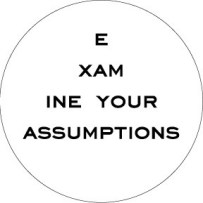
It has been a bad year. I will remember 2016 for the health challenges it presented amongst my family and I will remember it for the challenges it presented to me from a business and career perspective. Personally, I faced more adversity in 2016 than I have in any other year. And no other year was even close.
In June, I left my job as president and CEO at the National Investor Relations Institute, this after just 16 months on the job and having achieved some tremendous success, most notably the launching of a certification program, a major step forward for the organization.
“Why did you leave your job?”

I have been asked that question at least 100 times since June. Friends, family, colleagues, executive recruiters…people have been intensely and genuinely interested in my answer. But, then, when I begin to answer, something interesting happens. People don’t actually listen, this even when they initially were eager to hear the answer.
I’ll take it a step further, and this I found fascinating. Not only did people fail to listen to my answer, in almost every case, they already had created a narrative of their own as to why I left my job, a narrative in most cases that they were incapable of altering. And I’m talking about people who care deeply about me, but who also had a grand sum of ZERO knowledge of the situation other than the explanation I would provide. My story, their only access to a situation in which they had genuine interest, was functionally ignored.
 Let me pick on my father, as an example, one of the best human beings who ever has walked the face of this Earth. When I called him with the news that I’d left my job, he listened for five or ten minutes as I explained. He then asked two questions. 1) “Do you think maybe you betrayed your political views at work?” 2) “You have quite a temper; how often do you fly off the handle at work?” (I feel compelled to answer, “never, not ever” to the latter question)
Let me pick on my father, as an example, one of the best human beings who ever has walked the face of this Earth. When I called him with the news that I’d left my job, he listened for five or ten minutes as I explained. He then asked two questions. 1) “Do you think maybe you betrayed your political views at work?” 2) “You have quite a temper; how often do you fly off the handle at work?” (I feel compelled to answer, “never, not ever” to the latter question)
 Let’s put aside the fact that my father—a professor in philosophy—continues to assess his 49-year-old son’s impulse control by the ten-year-old version of that son’s reaction to a single Boston Red Sox loss in October of 1978 (but, holy cow, there’s one out in the 7th inning and we’ve got a two-run lead and BUCKY DENT hits a three-run homer? Bucky Flippin’ Dent?).
Let’s put aside the fact that my father—a professor in philosophy—continues to assess his 49-year-old son’s impulse control by the ten-year-old version of that son’s reaction to a single Boston Red Sox loss in October of 1978 (but, holy cow, there’s one out in the 7th inning and we’ve got a two-run lead and BUCKY DENT hits a three-run homer? Bucky Flippin’ Dent?).
In any case, my own father, who had exactly zero insight into why I would leave my job other than my explanation, created his own narrative, his own story. His version of why I left my job was apparently that I regularly had been running down the halls of my office, naked, screaming political views at the top of my lungs.
 I found myself in the middle of a fascinating case study. With just one or two exceptions, one of which I’ll mention shortly, everyone who asked me about why I left my job seemed to have created their own version of why I did. But in not a single case—not ONE—did they have access to information that could have led them to a more accurate answer than the answer I provided.
I found myself in the middle of a fascinating case study. With just one or two exceptions, one of which I’ll mention shortly, everyone who asked me about why I left my job seemed to have created their own version of why I did. But in not a single case—not ONE—did they have access to information that could have led them to a more accurate answer than the answer I provided.
Here’s another example. Shortly after I left my job, I met with an executive recruiter. We exchanged pleasantries at the end of the conversation and he told me he would be following up with a few references. Two weeks later, he called me back, astonished, and said, “That story you told about why you left your job? It’s COMPLETELY true.” Without a reason to doubt my account of events, the recruiter had created his own version of MY story, which was, among other things, incorrect. I will give him ENORMOUS credit, though, for being willing to change his perspective. As Kareem Abdul Jabbar once said: “It is easier to jump out of an airplane without a parachute than to change an opinion.” By the way, six months later, I’m convinced that my dad still has that “Jim running naked down the office hallways, spewing political rhetoric” thing bouncing around his big head.
 It often is said that the most important component of communication is listening. I can say, based on my recent experience and with some level of authority, that there are very few people who listen well. Earlier this year, a meme went around social media, which actually originated from author Stephen Covey. It said: “Most people do not listen with the intent to understand; they listen with the intent to reply.”
It often is said that the most important component of communication is listening. I can say, based on my recent experience and with some level of authority, that there are very few people who listen well. Earlier this year, a meme went around social media, which actually originated from author Stephen Covey. It said: “Most people do not listen with the intent to understand; they listen with the intent to reply.”
I am, I think, a good listener. I’m getting better, but I’m still not great. That’s because this year’s ad hoc case study has provided me with the opportunity for introspection. Even as I have compelled myself to be more acutely aware of my listening, I still observe many moments in my life and in my business when I don’t fully examine the facts that are presented to me or listen without preconceived judgment to the stories that others are telling me. I still fill in gaps with my own prejudices and make assumptions to tie up stories that sometimes are contrary to the best information, which is what I’m being told.
 We live and operate in a world that is built around conflict. In the book The Argument Culture, the author Deborah Tannen says it this way: “The argument culture urges us to approach the world—and the people in it—in an adversarial frame of mind. It rests on the assumption that opposition is the best way to get anything done: The best way to discuss an idea is to set up a debate; the best way to cover the news is to find spokespeople who express the most extreme, polarized views and present them as ‘both sides;’ the best way to settle disputes in litigation (is to pit) one party against the other; the best way to begin an essay is to attack someone; and the best way to show you’re really thinking (and, I would add, to show you’re “listening”) is to criticize.
We live and operate in a world that is built around conflict. In the book The Argument Culture, the author Deborah Tannen says it this way: “The argument culture urges us to approach the world—and the people in it—in an adversarial frame of mind. It rests on the assumption that opposition is the best way to get anything done: The best way to discuss an idea is to set up a debate; the best way to cover the news is to find spokespeople who express the most extreme, polarized views and present them as ‘both sides;’ the best way to settle disputes in litigation (is to pit) one party against the other; the best way to begin an essay is to attack someone; and the best way to show you’re really thinking (and, I would add, to show you’re “listening”) is to criticize.
 So, I wonder, how many problems exist in this world, how many misunderstandings occur regularly, just because people don’t actually listen? I shudder to think about how our government operates, how political campaigns transpire, how businesses function, and, then, how the media covers all of it, this when practically NO ONE is listening, not really.
So, I wonder, how many problems exist in this world, how many misunderstandings occur regularly, just because people don’t actually listen? I shudder to think about how our government operates, how political campaigns transpire, how businesses function, and, then, how the media covers all of it, this when practically NO ONE is listening, not really.
My wife Jenny and I are building a business, SRD Communications, around the concept of storytelling. I can tell you that the single most important element of storytelling is, first of all, to listen actively as you’re having conversations. When you really begin to listen, when you stop filling in the gaps with your existing attitudes, opinions, and prejudices, it is nearly a life-altering experience.
Let me now tell you about the best listener I have encountered since June, a family friend whose name is “Lisa.” We see Lisa maybe two or three times a year. She’s a wonderful person, but there always was something about Lisa that made me uncomfortable, but I didn’t know what it was. This summer, Lisa became an unwitting subject of my little case study. And I finally figured out what made me uncomfortable about Lisa: she is the most genuine, active listener I have ever known.
Lisa is full of questions, which a lot of people are, but she does this amazing thing that’s different. She asks you a question and then she listens with every fiber of her being as you respond. She never interrupts. She doesn’t have “a reply” in mind; she just wants to listen to your answer. She watches you and her facial expressions and her eyes make it crystal clear that she’s not only listening, but that she is developing an understanding of whatever topic you’re discussing based on what you say. She informs her next question based on your answer to her last question. It’s exactly that simple.
That is what I’m working toward in 2017: To Listen Like Lisa.
December 23, 2016 at 6:16 pm
Hi Jim –
So good to hear from you and see that you are doing well. Also glad to see that you are moving forward with your work. I have now been in a semi retired state for 2 years but still working with a friend trying to get his VC company going. It has been interesting doing this and we shall see what develops. Like you, important to not sit around but always moving forward. Take care and call me sometime if you are out my way. Frank Dohn
LikeLike